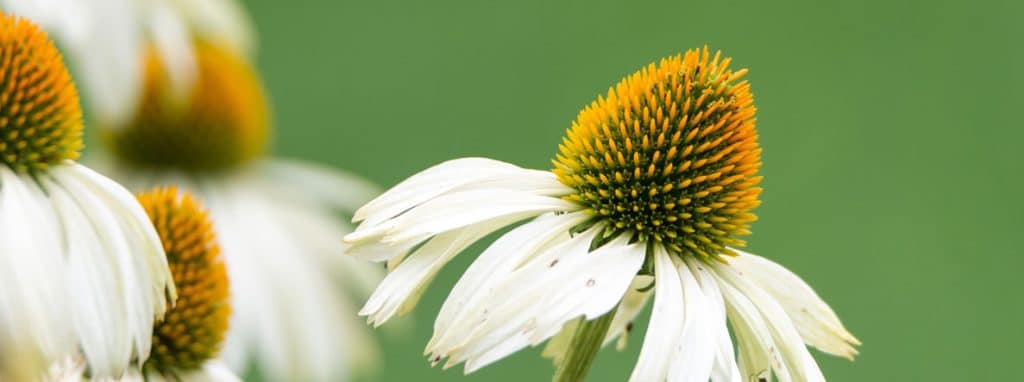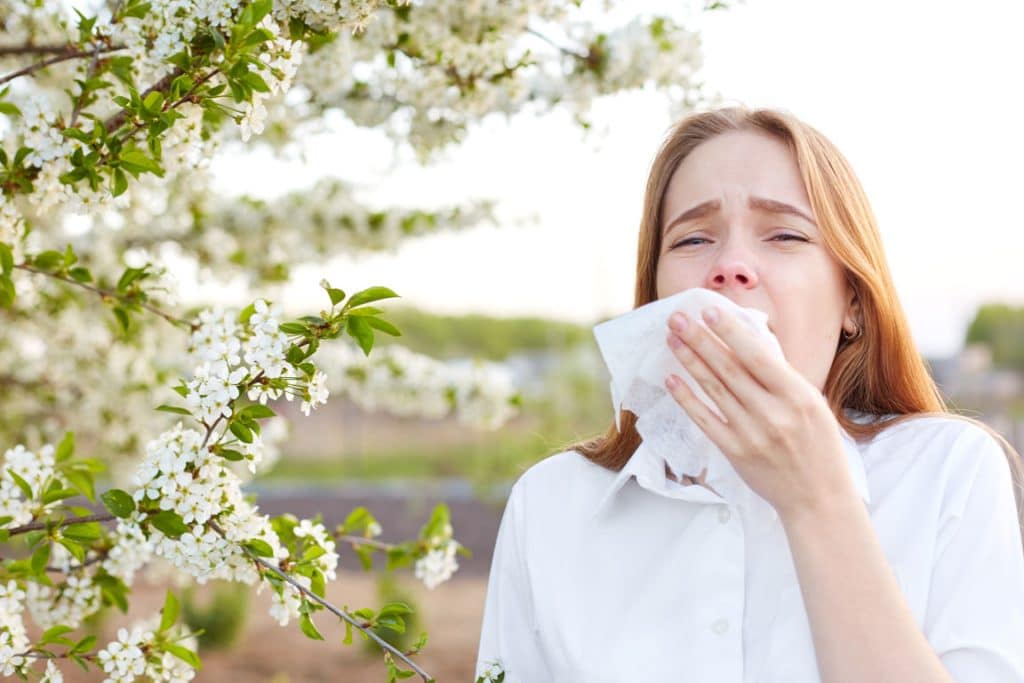Ahhhh, warm spring air! It’s glorious, isn’t it? The sun, the rain showers, the smell of the trees blooming, and grass growing. But for many, the enchantment of spring unceremoniously ends with half a dozen sneezes, a pounding headache, and swollen sinuses. Welcome, seasonal allergies!
Seasonal allergies, also known as hay fever and allergic rhinitis, affect about a quarter of the US population. Approximately 81 million people in the U.S. were diagnosed with seasonal allergies in 2021. That’s around 26% of adults and 19% of children. Seasonal allergies are most often caused by three types of pollen: grass, tree, and weed. At Xpress Wellness Urgent Care, we help patients manage and treat their seasonal allergies nearly every day of the year.
What causes a seasonal allergy reaction?
Every person’s body has an immune system that is responsible for fighting off illnesses, defending the body against infection and protecting the body’s cells. Allergies occur when a foreign substance–like pollen, dander, venom, or another substance–enters the body and causes a reaction with the immune system.
When your immune system identifies a foreign substance it considers dangerous, it develops substances called antibodies. Antibodies can be developed for substances that are not actually harmful to the body, like pollen or foods that most people eat without a reaction. The overreaction by the immune system sends the antibodies to attack the invading substance and along the way, chemicals are released causing an allergic reaction.
So, next time your face and nose are swollen, or your throat is scratchy and inflamed, you can blame your antibodies for attacking seasonal pollen invaders you’ve breathed in.

Here are a few of the most common seasonal allergens in Oklahoma and Kansas:
- Tree pollen – Different trees pollinate in Oklahoma and Kansas at different times of the year, nearly year-round. In particular, spring into early summer and late fall are especially significant tree pollen times.
- Grass pollen – Grasses pollinate in two seasons in Oklahoma and southern Kansas. Cool-season grasses pollinate for about a month beginning in late February or early March. Warm-season grasses begin when the weather gets warm in early summer and continue until the first hard freeze.
- Weeds – Some weeds begin pollinating in late spring, and others start in late summer. Pollination typically continues throughout the fall until a hard freeze.
- Mold – Unfortunately, mold is very common in Oklahoma and southern Kansas most days of the year. Especially so during rainy seasons.
Why are some allergic reactions worse than others?
The severity of your reaction is uniquely determined by how your immune system responds to pollen or allergens. Every person’s response is different, and your reactions may differ from year to year. If there is an exceptionally wet spring in Oklahoma or Kansas, our Xpress Wellness Urgent Care team may see many more patients with allergic reactions to mold.
In the early spring, tree pollen is a very common allergen. Each season brings new allergens to the air, and the incredibly windy nature of Oklahoma and Kansas means more opportunities for those to blow around and cause irritation and allergies.
Common Seasonal Allergy Symptoms
Often, seasonal allergy symptoms are sneaky. First, you might feel a little itch in your throat. An hour later, your nose is a little stuffed up. You go to bed that night feeling decent, but when you wake up… you have every hay fever symptom imaginable, and it’s hard to think straight.
Here’s a list of some of the common symptoms of seasonal allergies. The severity and longevity of your allergies can vary and present in various combinations.

Common seasonal allergies symptoms and signs:
- Itchy mouth, nose, or throat
- Runny nose
- Stuffy nose
- Temporary loss of smell
- Sneezing
- Drainage from the nose down the back of the throat (postnasal drip)
- Headache
- Dry cough
- Itchy, watery, or red eyes
- Circles under eyes
- Tiredness
- Scratchy or sore throat
- Snoring caused by congestion
How can I tell the difference between seasonal allergies and other illnesses?
“Oh, I’m fine. I’m sure it’s just allergies!” Maybe you’ve said that and later regretted it, or you’ve had a coworker share their illness with the office as they sneezed throughout the workday. Sometimes it’s hard to tell if your body is fighting off ragweed in the Oklahoma air or something more serious.
There are a few key signs to look out for to distinguish between allergies and something else.
- Itchy eyes, nose, ears, and throat usually indicate allergies
- Allergies do not cause fevers
- Allergy coughs sound dry, not wet
- Allergies don’t usually cause body aches
Seasonal allergies, the common cold, RSV and COVID-19 all affect your respiratory system; therefore, they often share symptoms. Look for the differences in typical symptoms, but see a healthcare provider when in doubt. At every Xpress Wellness Urgent Care location, our providers can evaluate your symptoms, test for flu, COVID-19, or other illnesses, and help you recover.
Seasonal Allergies in Kids

Seasonal allergies are prevalent in children. Symptoms of seasonal allergies in children are similar to adults. They include congestion, itchy or watery eyes, and a dry cough. See a provider for a clinical exam if you observe new seasonal allergies or symptoms that worry you.
For many children, seasonal allergies can become a challenge if the child also has asthma. Childhood asthma affects many children, and seasonal allergies are known to trigger asthma reactions. It’s essential to discuss seasonal allergies with your child’s doctor and determine if medicines or additional testing are needed to ensure seasonal allergies do not cause severe asthma attacks.
Seasonal Allergy Testing, Treatment, and Management
If your seasonal allergies are severe and inhibit your daily life regularly, you may want to visit a specialist for further testing and treatment. However, for most people, seasonal allergies can be managed and kept at bay. The tips below outline how to manage and treat your seasonal allergies.
Reduce Exposure
If you have observed heightened seasonal allergy reactions during certain times of the year, consider spending less time outside during those weeks. If you are particularly sensitive to the pollen of Bradford Pear tree pollen or ragweed, make note and plan accordingly. Additionally, limiting your exposure to allergens could mean: switching the air filters in your house more routinely, using HEPA air purifiers, avoiding lawn and garden work when allergens are present, and staying inside on windy days.
Watch the Pollen Counts
TV, radio, news, and internet sources report pollen counts daily. Staying apprised of pollen reports and taking allergy medicine before symptoms begin is a recommended proactive approach.
Over-the-Counter Allergy Treatment
Several over-the-counter, nonprescription medications could be helpful in the management and treatment of seasonal allergies. Oral antihistamines like Claritin, Allegra, and Zyrtec help relieve watery eyes, stuffy nose, and itching. Additionally, oral decongestants or a decongestant combined with an antihistamine may be helpful. Nasal sprays, including corticosteroid and cromolyn sodium, can also ease symptoms. Before beginning a new medication, speak with a healthcare provider. Additionally, you can rinse your sinuses with a saline rinse at home to flush out congestion.
Visit the Doctor for Seasonal Allergy Help
If at-home remedies and over-the-counter medications don’t seem to cut it, don’t hesitate to visit Xpress Wellness Urgent Care. Sometimes severe congestion and allergies can progress and cause other illnesses. Our providers can treat sinusitis (sinus infection) or other illnesses of the respiratory system.
Find Your Nearest Xpress Wellness Today
If you are suffering from severe seasonal allergies or are unsure if your illness is allergies, find the Xpress Wellness Urgent Care nearest you and get checked out by one of our medical professionals. Our team is ready to help!



